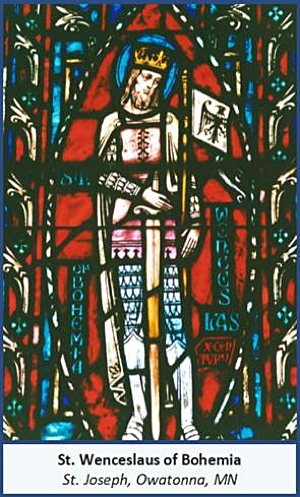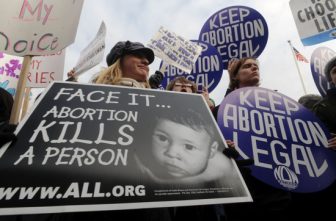St. Wenceslaus was born near Prague in 907. His father was Duke Wratislaw and his mother was Drahomira, the daughter of the chieftain of the Veletians, a Slavic tribe to the north. She was a pagan and opposed Christianity. St. Wenceslaus was educated and raised in the faith by his grandmother, St. Ludmilla.

St. Wenceslaus rose to power as the Duke and king of Bohemia in 922 at the age of fifteen. He promoted Christianity and worked to ease tensions between Christian and non-Christian factions. Society was chaotic. There were nobles who abused their power and ruffians who intimidated the peasants. St. Wenceslaus was strict and firm, restored order, and suppressed the lawless.
As he began his reign his advisors urged him to charge his mother with treason to take revenge for the murder of his grandmother and her efforts against Christianity. With mercy and forgiveness he refused to send his mother into exile.
St. Wenceslaus was a man of utmost faith and a benevolent ruler. According to an old Slavic legend, he “was charitable to the poor, and he would clothe the naked, feed the hungry and offer hospitality to travelers according to the summons of the gospel. He would not allow widows to be treated unjustly; he loved all of his people, both rich and poor” (Office of Readings).
The Bavarians attempted to invade Bohemia from the south, and under his military leadership the Bohemian army was able to repel the attack, and he was widely acclaimed by his people.
St. Wenceslaus took a friendly posture toward Christian Germany, recognized King Henry the Fowler of Germany as the successor of Charlemagne, and acknowledged that the king was overlord of Bohemia. Some of the nobility vehemently disagreed with this policy. In addition, the non-Christian nobles resisted his pro-Christian position. While he strove for unity and harmony, there was much dissension and opposition.
St. Wenceslaus was married and had a son. His younger brother Boleslaus was jealous, and when he realized that his nephew would inherit the throne ahead of him, he joined the anti-Christian opposition movement. Its evil leaders deceived Boleslaus, “Your brother Wenceslaus is conspiring with his mother and his men to kill you.” Boleslaus hatched his own murder plot.
Boleslaus invited his brother to his castle to celebrate the memorial of Sts. Cosmas and Damian on September 26. St. Wenceslaus was in the habit of going to church early each morning for Matins and Mass, and two days later Boleslaus was waiting at the church, struck him on the head, and two of his companions completed the assassination as they ran him through with their swords. He died on September 28, 929, at the age of 22. He was immediately recognized as a martyr, and his remains were taken to St. Vital Cathedral in Prague where they are enshrined.
St. Wenceslaus is the patron saint of the Czech Republic, Slovakia, Bohemia, and Moravia, and the cathedral of Cracow, Poland.




